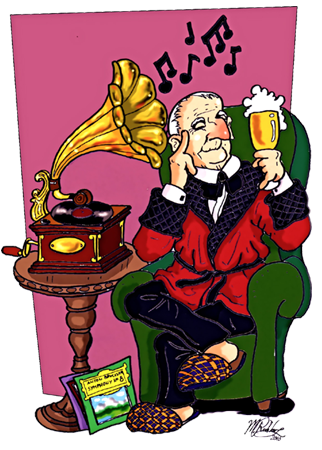|
|
Joseph Goebbels' Bruckner Speech at Ravensburg
|
 | |
|
Click to enlarge
|
The speech took place in Ravenburg's Market Square adjacent to Ravensburg's old Town Hall (Rathaus) in 1937. The Market Square was renamed the "Adolf Hitler Platz" during the National Socialist regime. The script follows Goebbels' usual style of linking Bruckner's music to the German soil. Below is an approximate translation:
« Today, my “ Führer ”, we have gathered in this solemn town to honor one of the greatest masters of German music.
Together with us, the whole German people, in deep gratitude for this genius, come to realize that with these new mighty symphonies, along with those of Beethoven, we have inherited an artistic legacy which belongs to the most proud heritage of our national music culture. But it is not the only thing that binds Anton Bruckner to these masters of the symphonic art. Furthermore, this figure of the last century has become unequivocally the most vivid and strong representative of the survival of our best musical traditions.
For us, this « Deutsche Kantor » and music-teacher, who was infused by the past musical heritage of the church, is a joyous sight. His works undeniably show humility and dedication, and deep admiration for his native folk-music. His various true-to-life accomplishments outside the church are most intimately linked. In our times, where art is confronted to the multi-faceted aspects of intellectual life which are characterized by the frantic team-work of specialists, his emergence is a rare stroke of luck.
In our music history, once again, the various fundamental principles of German music-making are strongly united. Like the salve for the sick, like the shapes and rhythms during spring-time, they are combined in a fertile synthesis. Besides, it was not easy for his contemporaries to understand at first, as a whole, the confusing picture of his personality. His art, like his physical appearance, are sometimes strange and almost incomprehensible. It took quite some time before Bruckner's bold musical language, originality and inner-logic were fully-understood by other circles. To this day, many of them falsely consider Bruckner's music as nothing more than a symphonic transcription of Wagner's art. Like in every baby, there is something quite unique and mystical, and to better understand it, one must go back to the roots of his creation: the « blood and race » , which are the basic forces of his origins.
His ancestors were peasants! As never before, we have associated this man's professional career and social rank to his peasant roots. But now, we are able to go back to the year 1400. His almost mystical mountain and close relation to nature, his strong and well-spoken statements which prove his feverish love for the homeland and for the great German fatherland, the simple straightness of his character, his deep family values, and yet, the proud awareness as a child of his own potential, his belief in tomorrow like a God's faithful - all these things which preserve our heritage make us realize how strong and fresh were are in such a time. »
|
|
|
 ABruckner.com
ABruckner.com